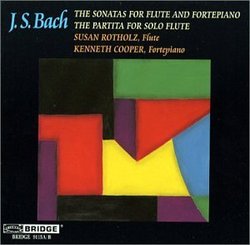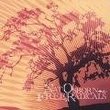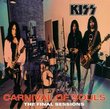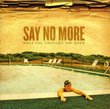Almost, but not quite...
Kirk McElhearn | A village in the French Alps | 03/30/2004
(3 out of 5 stars)
"Susan Rotholz and Kenneth Cooper present a unique recording of Bach's flute sonatas, using a fortepiano for accompaniment. The fortepiano is the earliest form of piano, and Bach is believed to have at least played one if not actually owned one himself. The sound of this instrument is much more restrained than a modern piano, but is indeed a piano, being hammered as opposed to being plucked like a harpsichord.When Cooper gets a chance to play a few measures alone, the result is brilliant. The opening of the Sciliano in sonata BWV 1031, and the solo sections later in this movement, are bubbling over with energy. Unfortunately, the tone of the flute and the recording itself tend to drown out the fortepiano. The flute is too present and overpowers the fortepiano when they are playing together.The liner notes speak of "perhaps a new approach to historically informed music-making", but this is only halfway true. While the choice of the fortepiano is indeed interested - and certainly more justified than using a modern piano - the use of a modern flute gives this recording a sound that just doesn't work. With a wooden flute, the sound would have been so much cozier, so much warmer. But the cold sound of a metal flute with the rich fortepiano just doesn't work.This seems a bit better in the B minor sonata, BWV 1030, where the flute, at least in the opening movement, is more hesitant, more interested in playing with the fortepiano, not against it and over it. For that is the real problem with this disc - it does not sound like the two instruments are truly playing together. They seem at odds with each other, rather than being part of the same music. But the closing movement of the same sonata is where the music suddenly works - the rhythm is right, the energy present, and the two instruments finally sound like they are working together. Cooper's brilliant dynamics, coupled with some excellent phrasing by Rotholz, make this movement a joy. A pity the rest of the set does not have this energy.This is an interesting experiment, and I would love to hear Kenneth Cooper play some more Bach on this lovely instrument (there is no mention of its pedigree). While there are some excellent moments in this set, the overall impression is not very compelling."


 Track Listings (13) - Disc #1
Track Listings (13) - Disc #1


